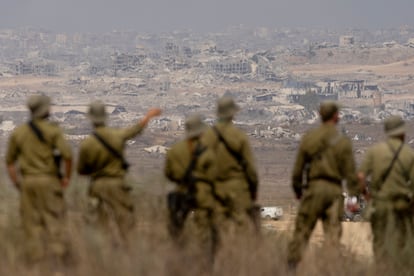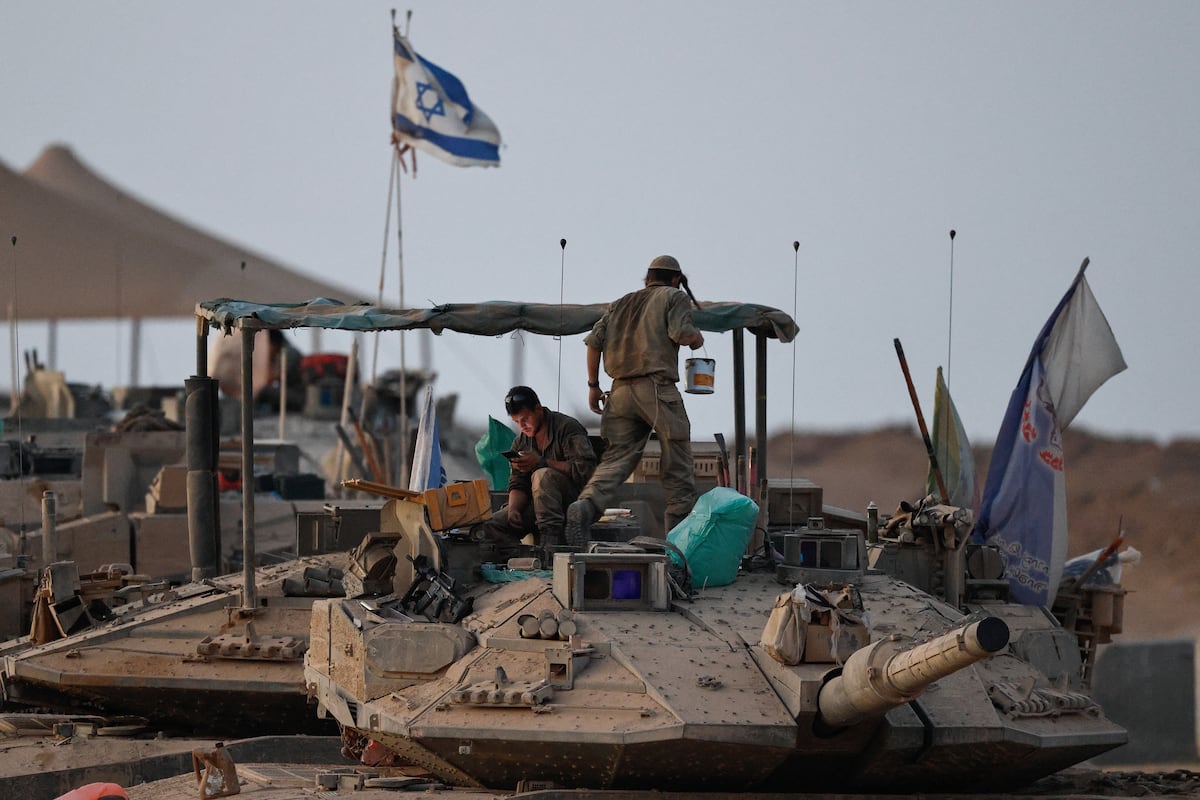When Elie (not his real name) entered Gaza in October 2023, still reeling from the Hamas attacks carried out days earlier in Israeli villages near the border, he put his mind on autopilot and had only two goals. “Protect my soldiers and get out of there alive,” he said in an interview with this newspaper months later.
“I didn’t go in with a sense of revenge. In reality, I acted almost mechanically. The government sent us to protect the Israelis and recover our hostages, but now I realize that the mission was actually something else,” says the 23-year-old first sergeant. “Our superiors aren’t thinking about the Israeli captives or the Palestinian civilians, but rather about displacing the population and destroying Gazan society.”
Elie’s name is not Elie. Protecting his identity and not providing details about his mission in Gaza that could help identify him is one of the prerequisites for this interview, facilitated by the Israeli NGO Breaking the Silence, formed by military personnel who have decided to speak out about the abuses they believe the Israeli army is committing in the occupied Palestinian territories.
His testimony is one of those collected by the organization in recent months, during which a “record number” of military personnel have come forward to describe actions by the army in Gaza that violate what the soldiers consider ethical and just.
“I came from the West Bank and had spent several months in the army there. There were things there that shocked me, too, but the red line for me was using the Palestinians in Gaza as human shields. Something clicked in my mind forever,” Elie says.
 Israeli army soldiers observe the destruction in the Gaza Strip last Wednesday.Amir Levy (Getty Images)
Israeli army soldiers observe the destruction in the Gaza Strip last Wednesday.Amir Levy (Getty Images)
This young Israeli served in Gaza as part of the Nahal Brigade, and his mission focused on the northern part of the Gaza Strip. In the spring of 2024, tens of thousands of Palestinians were moving south, following orders from the Israeli army, using a coastal route they called the “humanitarian corridor.” “Two young men were randomly chosen to serve as shields. One of them couldn’t have been more than 16 years old, practically a child. The intelligence officer told us they had connections with Hamas. At first, I found that strange given their age,” the soldier says.
The next morning, they began forcing them into buildings they were searching. A person gave them orders in Arabic about where to walk and what to do. “They were ahead of us in case there were hidden explosives or some kind of ambush waiting for us. That was too much for me,” says this young soldier, his face contorted as he relives those moments.
“We used them for a few days. When we didn’t force them into buildings, they were handcuffed and had their faces covered. They couldn’t do anything. If they wanted to go to the bathroom, one or two soldiers would accompany them. We gave them military rations to eat,” he recalls.
Breaking the Silence has received several testimonies from other soldiers denouncing similar practices. In August 2024, the Israeli newspaper Haaretz published an investigation into the “possibly systematic” use of human shields by the Israeli army, which also included testimonies from some Palestinians who had been victims of this abuse. The television network Al Jazeera also released a video showing Gazans being forced to wear Israeli military uniforms and enter buildings to check for booby traps or explosives.
“We didn’t speak Arabic in my platoon, and they didn’t speak Hebrew or English. They only spoke two words: hamam [bathroom, in Arabic] and Rafah, the southern city they were heading to when we captured them,” he recalls.
On several occasions, the Israeli army — a deeply respected institution in the country — has denied this practice, which is illegal under both local law and international norms. However, it did confirm to Haaretz that it was investigating about six suspected cases to determine whether such conduct had occurred among soldiers. At the same time, the Israeli army and government frequently denounce that Hamas has, for years, used Gazan civilians as human shields to hide tunnels or weapons in the Gaza Strip.
An Israeli soldier waits next to parcels of humanitarian aid at the Kerem Shalom crossing on July 24.
Amir Cohen (REUTERS)
“There were other moments in Gaza that made me think it was an unjust war, but that human connection between those two Palestinians and me was too much for me,” Elie explains. “When you see a 16-year-old boy trembling in fear in front of you, because of what we soldiers are doing to him, everything falls apart.”
A few days passed, and the soldiers in his platoon began expressing confusion and discomfort; the word “immoral” came up in conversation. “We spoke with our superiors in the unit to ask them to stop using these two civilians as shields, and the battalion commander came to talk to us. He told us that our lives were more important than theirs, that he had promised to take us back to our mothers, and that we didn’t have enough equipment or trained dogs for this type of mission,” he recalls.
The Israeli military has released the names of 898 soldiers and security officers killed since October 7, 2023. Of these, 329 were killed in Hamas attacks that day and at least 454 in military operations in Gaza.
Finally, the leaders of Elie’s unit let the two civilians go. They gave them a couple of bottles of water and a military ration and returned them to the road the Gazans were using to head south. “It was further proof that they weren’t Hamas members, that it wasn’t true, because if they had been, they would have been taken to Israel for investigation,” says Elie.
Elie’s unit did not use Palestinians as human shields again in the weeks that followed. Afterward, he left Gaza and has not returned to the army since.
“This practice is much harsher than burning houses or razing neighborhoods. In my platoon, we were largely in agreement on that, but it’s another thing to dare to say it out loud, even more so in the context of the October 7 attacks,” he says.
Today, medical documents confirm that Elie is suffering from post-traumatic stress disorder, and his superiors haven’t insisted that he return. “They called me, but I said no. Now I understand that it’s an immoral and unjust war. These are tough days for us in Israel,” he explains. “I’m not well. I’m asking myself a lot of questions about my responsibility in all of this, about what I did and what I could have done.”
Sign up for our weekly newsletter to get more English-language news coverage from EL PAÍS USA Edition

